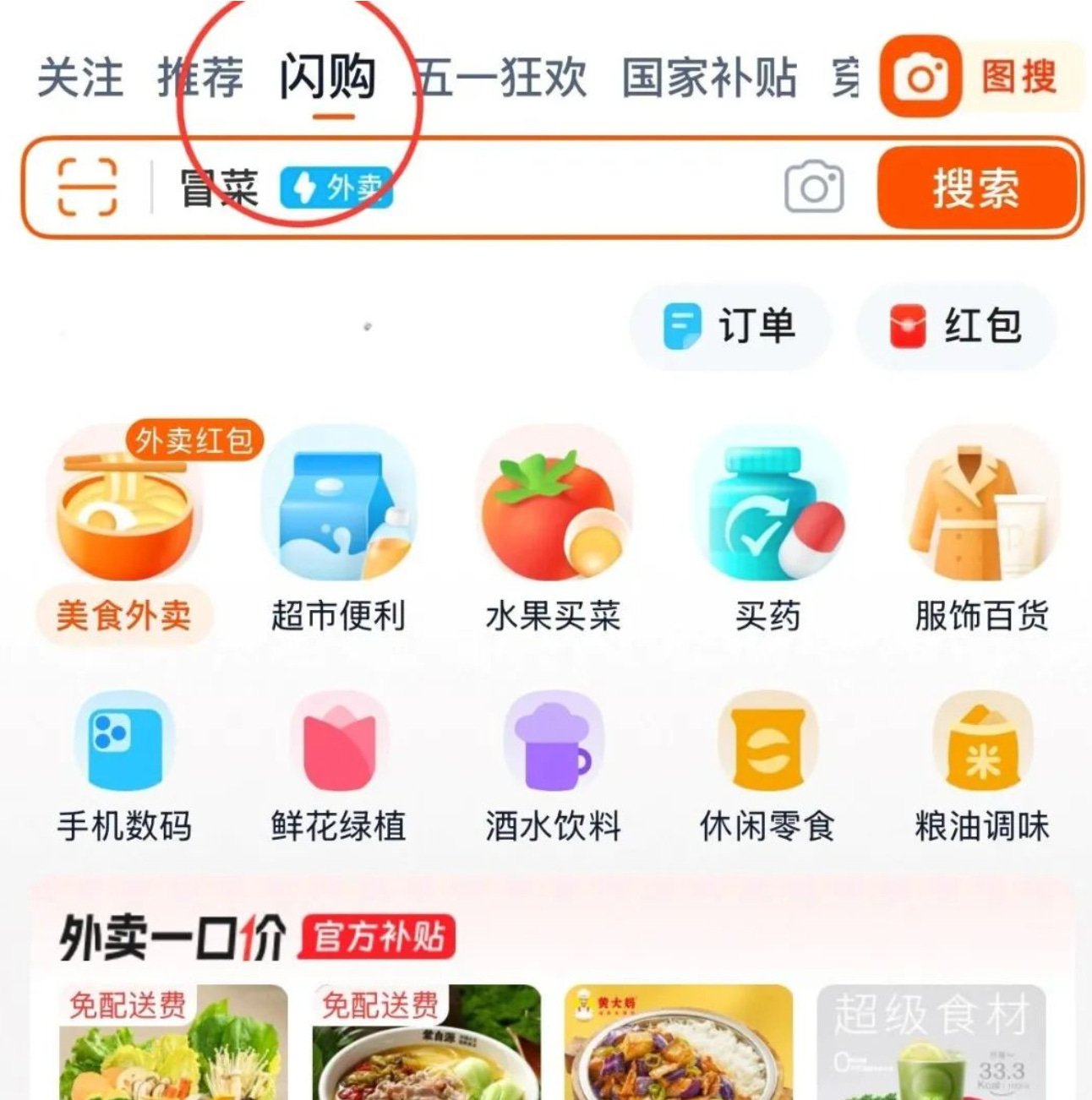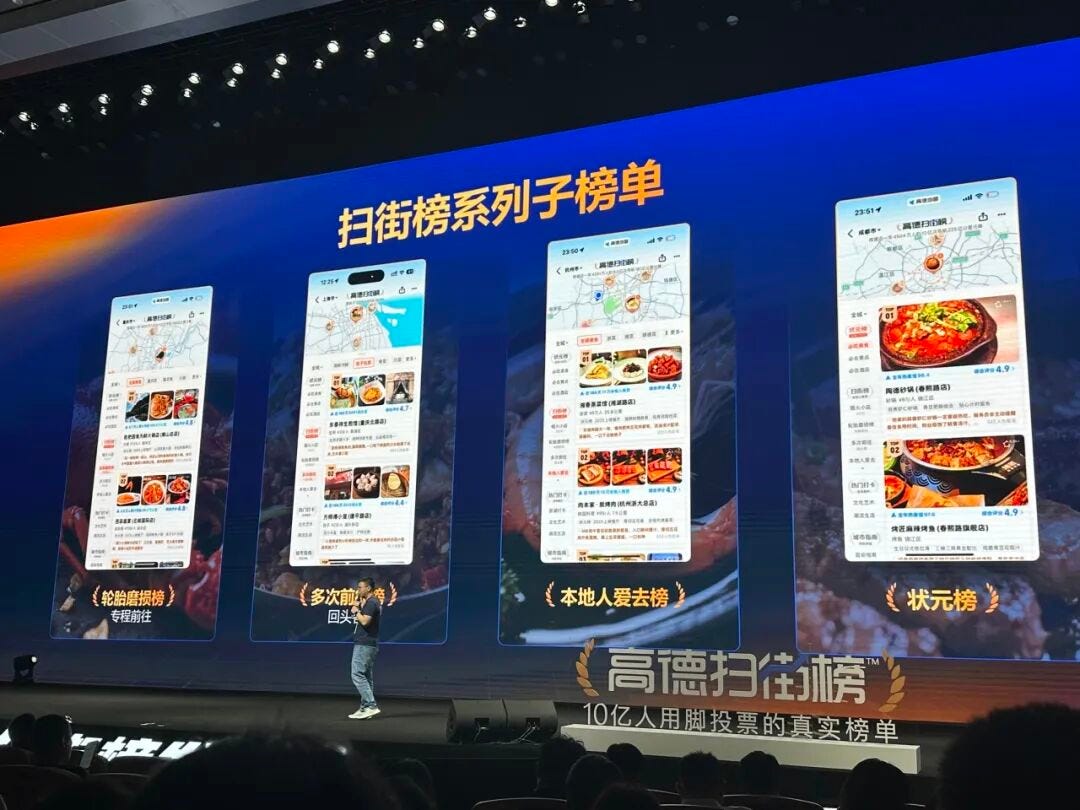A few things on my radar #23
Alibaba's Awakening >> Shangou (闪购), Amap (高德), and Jiang Fan (蒋凡)
👏🙋Hello, hello! Thanks for reading The Momentum — an independent publication without ads or affiliate links. Feel free to subscribe to receive new posts and support my work!
Shangou (闪购)🛍️
Alibaba's Shangou ( flash sale) business directly challenges Meituan's core operations

Taobao Shangou, revamped in April, delivers items in under an hour. Alibaba's "instant commerce" revenue grew 12% year-on-year to 14.8 billion yuan. The service now handles 120 million orders at peak daily volume (averaging 80 million in August), serves 300 million monthly users (triple April's figures), and employs 2 million daily couriers.
During August's earnings call, Jiang Fan, CEO of Alibaba's E-commerce Business Group, highlighted that instant commerce enhances overall Taobao engagement through its high-frequency usage. Alibaba forecasts these operations will generate an additional 1 trillion yuan in annualized GMV within the next three years.
Alibaba continuously challenges Meituan with a campaign bringing small merchants to its instant commerce platform, attracting over 260 Tmall brands to join the service, Alibaba announced Tuesday, reported by SCMP.
According to a friend of mine, Taobao Shangou is not operated by the Ele.me’s team but by the e-commerce team — they've integrated Ele.me's delivery capacity capabilities from the food delivery sector into the e-commerce system. This aligns with Alibaba's strategy mentioned in the earnings call: using high-frequency food delivery to drive growth in their core e-commerce business. In other words, food delivery business serves merely as a hook tool, not their ultimate goal. Needless to say — Alibaba's true ambition clearly lies in instant commerce — creating a retail empire that breaks down the boundaries between e-commerce and the physical economy.
Regarding "instant commerce," I haven't tracked or researched this topic extensively. For those interested in learning more, I recommend reading the professional analysis by The Great Wall Street.
In my memory, Alibaba has been integrating goods supply chains since the e-commerce era — given its accumulated experience across all retail segments including e-commerce, offline retail, warehousing, logistics, and even payment, it's easy to imagine how naturally and smoothly Alibaba can integrate production resources into its instant retail landscape. In short — no competitor possesses a similar full industry chain deployment like Alibaba.
However, this doesn't mean Alibaba is guaranteed to win. Several competitors have significant potential in this space — for instance, Pinduoduo, despite its low profile, possesses formidable capabilities in instant retail that shouldn't be underestimated. Meituan, currently constrained by temporary anti-monopoly "sanctions," will likely mount a powerful counteroffensive once regulatory restrictions ease. In fact, the real competitors might still be operating below the radar, waiting for the right moment to strike.
Moreover, Alibaba currently still relies on subsidies to fuel its growth. It remains to be seen whether these business segments can effectively merge and create synergies that form a sustainable business cycle — a process that will require considerable time to verify.
Amap (高德) 🗺️
Amap, Alibaba's mapping product, has also joined the ranks of those challenging Meituan

On September 10, Amap — one of the top five apps in China by user base — launched the "Street Stars" ranking —a direct challenge to Meituan's user review service Dianping. The core feature of this ranking is that it builds an evaluation model based on real travel behavior data from Amap users (such as in-store navigation numbers, repurchase rates, travel distance specifically to visit, etc.), and incorporates Alipay Sesame Credit Scores to give additional weight to reviews from high-credit users, combating fake orders and false reviews.
Amap officially announced — the Street Stars feature received over 40 million visits on its first day online, surpassing Dianping's user base — according to Quest Mobile, Dianping's daily active users in August 2025 were only around 30 million.
This initiative represents "a significant step towards Alibaba's vision for a super-app strategy," JPMorgan analysts noted in a Wednesday research report. "Amap is increasingly positioned as Alibaba's primary entry point for offline local services, functioning parallel to Taobao as the online traffic gateway."
Interesting — Amap appears to have identified a rare untapped opportunity in China's saturated internet market. Unlike Google Maps, which integrates business reviews into its local search ecosystem, China lacks a comparable service. This approach differs significantly from Meituan (China's equivalent of Yelp), which filters reviews using quality-based algorithms, limiting consumer perspectives when evaluating physical businesses.
Moreover, Meituan's monopolistic position and excessive commercialization of its review ranking system have sparked widespread criticism. Industry professionals and consumers alike often joke that Meituan ratings should be interpreted inversely—establishments with scores above 4.6 have likely purchased advertising or used fake reviews, while those around 4.3 tend to be the genuinely authentic, high-quality businesses. This leaves Amap's "non-commercialized" ranking system strategically positioned to fulfill consumers' demand for authentic rankings.
Think large — Amap's location-based service capabilities give Alibaba a unique competitive edge in the instant retail war. No rival can match this advantage—Baidu Maps lacks e-commerce and food delivery integration, JD has no mapping platform, and Meituan has neither e-commerce capabilities nor mapping services.
Jiang Fan (蒋凡) 👨
Jiang Fan, CEO of the core e-commerce business, is viewed as the key person behind Alibaba's current comeback
After losing his partnership status due to an affair scandal, Jiang was reassigned from Taobao-Tmall to overseas markets in late 2021—widely seen as an exile. Yet he transformed Alibaba's international business into its fastest-growing segment. By July 2023, he rejoined the partnership, and in November 2024 became the first executive to lead both domestic and international e-commerce operations simultaneously.
In 2024, Alibaba restructured with a "1+6+N" model, making Local Life a major business unit. By June 2025, Ele.me and Fliggy joined the E-commerce Business Group under Jiang Fan, who quickly unified Alibaba's e-commerce operations from "distributed" to "integrated." This strategic shift countered competitors like Pinduoduo and Meituan while marking Jiang's career revival.
Although almost all local media portray Jiang Fan as a savior, this is clearly not the whole story. You cannot expect a large organization to change overnight because of one professional manager—that's unrealistic.
Let’s be real — Jiang is not the soul of Alibaba — and Alibaba's fate ultimately relates to only one person — the man who calls himself "风清扬" — only he could magically drive such decisive focus changes, invest unlimited resources in few businesses, bring back the controversial leader — Jiang Fan — without internal resistance.

In short, Alibaba hasn't really changed — it has simply returned to its normal track.



